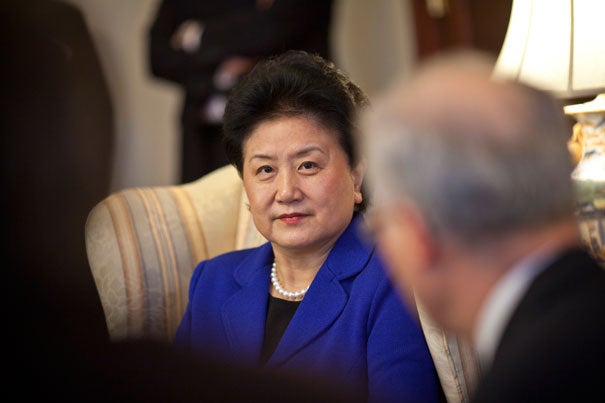
Harvard signed an agreement with the China Scholarship Council that will offer yearly fellowships for up to 35 Chinese students to attend the University at the graduate level. Madame Liu Yandong, Chinese state councilor, said, “I think that there is a lot that we can learn from Harvard, and I really hope that we can step up our cooperation in this field.”
Justin Ide/Harvard Staff Photographer
New Chinese student program
Agreement will bring more graduate-level scholars to Harvard
Signaling its continued commitment to educational and cultural exchanges, Harvard signed an important agreement Wednesday (April 13) with the China Scholarship Council (CSC) that will offer yearly fellowships for up to 35 Chinese students to attend the University at the graduate level.
The new collaboration will provide funds from the CSC, a nonprofit that provides financial assistance to Chinese citizens to study abroad, for up to 20 students earning master’s degrees at any of Harvard’s seven Schools — the Graduate School of Arts and Sciences (GSAS), Harvard Business School (HBS), Harvard Graduate School of Design (GSD), Harvard Graduate School of Education (HGSE), Harvard Kennedy School (HKS), Harvard Law School (HLS), or Harvard School of Public Health (HSPH) — with the CSC also covering living expenses and round-trip airfare for the students.
In addition, the CSC will support up to 15 doctoral students annually in the same Schools (although HKS Ph.D. degrees are issued through GSAS) with their first two years of tuition, plus living allowances, and airfare.
Harvard will retain control of the admissions process. The CSC will manage a separate application process for the awards.
Madame Liu Yandong, Chinese state councilor and head of China’s ministries of education, science/technology, and culture, attended the signing ceremony and luncheon at Harvard’s Loeb House. Liu was accompanied by a large Chinese delegation that included Minister of Education Yuan Guiren and Ambassador to the United States Zhang Yesui.
Liu Jinghui, secretary general of the China Scholarship Council, signed the agreement along with Jorge I. Domínguez, Harvard’s vice provost for international affairs.
“Your presence here today reaffirms China’s interest in Harvard, and we are delighted to acknowledge and celebrate this new investment in our relationship,” Domínguez said, reading a letter from Harvard President Drew Faust praising the partnership.
In her remarks, Liu outlined a suite of new domestic policies for China based on fundamental economic, social, and educational reforms. China, she said through an interpreter, was committed to opening up and “further embracing the world.” Continued collaboration with Harvard, noted Liu, represents an important step in that direction.
“I think that there is a lot that we can learn from Harvard, and I really hope that we can step up our cooperation in this field,” she said, adding, “I really wish that we would take this as a new starting point … to write a new chapter in the China/U.S. people-to-people exchange.”
Harvard’s longstanding institutional ties to China include the Harvard-Yenching Institute, Harvard’s John King Fairbank Center for Chinese Studies, and the recently opened Harvard Shanghai Center, which will serve as a center for teaching and research.
Domínguez, on behalf of Harvard, presented Liu with an engraved silver bowl. In return, Liu presented Harvard with a library of more than 100 volumes of classic Chinese works.




